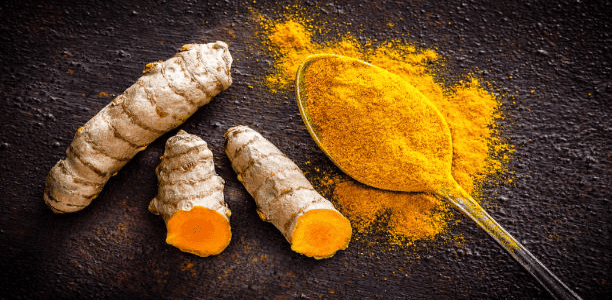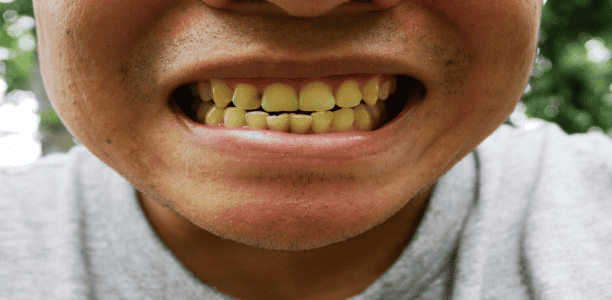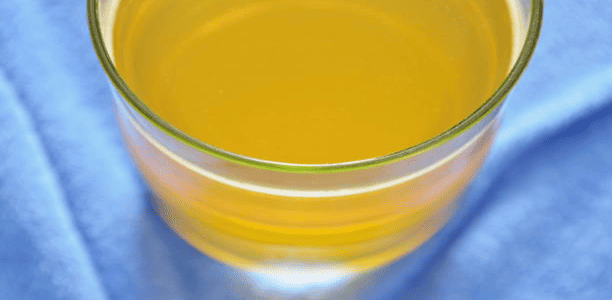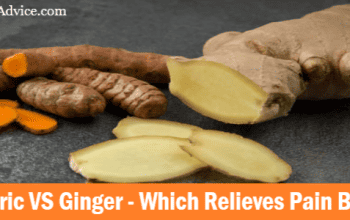
Does Turmeric stain your teeth permanently?
What are the other adverse reactions it can cause?
In this article, let's talk about the safety of this herb.
Also – we're going to find out how to avoid possible side effects.
So if you want to learn more about Turmeric then this article is for you!
Note: This article includes references and studies on Turmeric and its side effects.
Does Turmeric Stain Your Teeth? (In A Nutshell)
Turmeric can be easily recognized as an ingredient due to its vibrant color.
To be exact – it has an intense yellow pigment due to its Curcumin content.
Generally, it's safe and beneficial but it can also cause side effects if not consumed properly.
The first and most famous question is “Does it cause teeth staining?”
Yes since the enamel of our teeth is porous making it easy for the pigment to adhere.
BUT you can definitely avoid it since it's not a very serious case.
It's by brushing your teeth regularly and performing proper dental hygiene.
Besides that problem, Turmeric can also cause possible adverse reactions:
- allergic reactions
- diarrhea
- blood thinning
Again – for some people, Turmeric can be an allergen for them (and not for others).
So if that's the case, you need to properly address it and find better alternatives.
Also – it's by consulting a medical professional to get personalized guidance.
It's the same case for the potential excessive blood thinning it can cause.
In general, Turmeric alone won't make your blood dangerously too thin.
But since it has the tendency to interfere with platelet activities, you need to be cautious.
Especially if you're someone with certain health conditions that require anticoagulant drugs.
Simply because its interaction with these medications could go the wrong way.
With that, it's best to seek advice from your doctor before trying it.
Lastly – diarrhea is one of the common side effects of any supplement, food or beverage.
So to not experience it, always start by consuming a low amount and take it from there.
Overall – Turmeric has a lot of beneficial effects on our health.
But just be responsible if you plan to incorporate it into your lifestyle.
Does Turmeric Stain Teeth?
Stained teeth are probably the most common side effect of Turmeric.
Well – here are the possible reasons why it happens [1]:
- Turmeric contains a bioactive compound called Curcumin
- this compound has an intense natural color yellow pigment
- also, it's sometimes used as a histological stain due to its affinity properties
To make it clearer, Turmeric has the potential to stain your teeth.
It's because of the Curcumin content which has a high affinity toward biological membranes [2].
So the strong yellow pigment of it can adhere to the surfaces of the teeth.
Additionally – the enamel (first layer) of our teeth is porous [3].
So it's easier for the molecules of Curcumin to attach to it resulting in teeth discoloration.
Sure – we can't deny the fact that Turmeric has a lot of promising benefits.
So in order to not miss them, let me give some tips on how to not get stained teeth:
- Brush your teeth regularly including your tongue to reduce pigment build-up.
- Rinse your mouth with water after consuming foods with Turmeric.
- When drinking beverages with Turmeric, try to use a straw (preferably reusable).
- Practice regular dental cleaning by a dental hygienist or dentist.
- Try alternative forms of Turmeric such as supplements instead of raw or powdered ones.
Overall – the staining caused by Turmeric is not very serious.
You can minimize it by doing proper dental hygiene or finding alternative ways to consume it.
So you can still get the benefits without worrying about potential teeth discoloration.
Turmeric & Diarrhea
Another potential side effect of Turmeric is diarrhea.
The most common symptoms of it are listed below [4]:
- frequent bowel movement
- watery stools
- abdominal pain/cramps
- dizziness or fever
- bleeding (rare cases)
In the previous article, we discussed the benefits of Turmeric for inflammation.
Most especially when it comes to relieving the symptoms of digestive inflammation.
So how come it can cause diarrhea?
Well – Turmeric has the ability to control intestinal motility/contractions [5].
In addition, it can also stimulate bile production which is helpful for digestion [6].
However – consuming high doses of Turmeric for a long period of time can result in several issues:
- overstimulated intestinal muscles can result in diarrhea and other related symptoms [7]
- it can also affect the absorption of nutrients and water which can cause loose stools [8]
- irritation in the gastrointestinal lining can potentially happen which can disrupt normal digestion
- a high amount of bile in the intestine (Bile acid malabsorption) can trigger chronic diarrhea [9]
Now – there are still a lot of ways to lower the chances of getting diarrhea while taking Turmeric.
But let me list down some general tips that can hopefully help you:
- If taking a Turmeric supplement, start with a low dose to see how your body will react.
- You can then gradually increase it up to the amount you can tolerate.
- Choose high-quality and reputable Turmeric products.
- Try taking Turmeric with food or beverage to reduce the risk of stomach pain.
Lastly, make sure to drink a lot of water daily since it can also help regulate bowel movements.
Overall – you can steer clear of diarrhea when taking Turmeric.
You just have to do proper precautions and don't overconsume it.
Turmeric & Allergic Reactions
Firstly – an Allergic Reaction is not a rare adverse reaction.
It's a condition where the immune system reacts to inert substances in the environment (allergens) [10].
Also – the source of triggers differs from one person to another.
So how will you know if you're experiencing it?
Well – I listed some of the signs that you're having an allergic reaction [11]:
- sneezing or runny nose
- tenderness or pain around the face
- breathlessness, wheezing or coughing
- rashes, hives or itchy skin
- swollen mouth, throat, eyes or lips
- diarrhea and feeling sick
Now – Turmeric is considered an herb or spice that can be used in foods and drinks.
Just like other normal ingredients, it can also act as an allergen to some people.
So if you're one of them, your immune system will react to it.
As a result, it will produce antibodies to counter the threat it perceives [12].
Turmeric belongs to the plant family Zingiberaceae together with ginger, cardamom and galangal [13].
So if any of them is an allergen for you then there's a high chance that you're allergic to Turmeric too.
It's because your immune system might recognize the similar protein patterns present in it (cross-reactivity) [14].
So to reduce the risk of Allergic Reactions from happening, I have some tips for you:
- Consult a healthcare professional for an accurate diagnosis to know if you're allergic to Turmeric.
- If you're allergic, don't eat any food/product containing it as one of the ingredients.
- Be cautious with Turmeric if you know that you're allergic to its family herbs.
- Find alternative herbs and spices to flavor your food or that have the same benefits as Turmeric.
- Always bring emergency medication just in case you accidentally consume Turmeric-containing food, drinks or products.
Overall – Turmeric comes with a lot of benefits for the body.
However, you also need to consider the risks if you're allergic to it.
There are other herbs that have amazing effects on overall health so just find an alternative.
So if you have experienced unpleasant experiences with it before, you might want to consult a doctor.
In that way, you'll have personalized guidance to know the other things that you're allergic to.
Turmeric & Blood Thinning
Lastly, Blood Thinning is an effect of medicines that aim to prevent blood clots from forming [15].
They are sometimes called anti-clotting or anticoagulant drugs.
To give you an idea, here are the health conditions that require it [16]:
- risk of stroke and heart attack
- pulmonary embolism
- deep vein thrombosis
- replacement surgeries (joint, hip, knee or heart)
- irregular heartbeat (arrhythmia)
- antiphospholipid syndrome
So how can Turmeric contribute to Blood Thinning?
Again – it contains Curcumin which is a compound that can inhibit platelet aggregation [17].
However, this alone is not really considered alarming since it has weak interference with platelet activities.
Now – if you're someone who's required to take anticoagulant medications, you need to be cautious.
Simply because the combination of them with Turmeric can go the wrong way.
Curcumin's interaction with anticoagulant drugs can potentially make your blood too thin.
As a result, you might experience intense bleeding or hemorrhage which are quite dangerous [18].
If you want to avoid excessive blood thinning while taking Turmeric, here are some precautions to consider:
- If you're taking anticoagulant drugs, consult with a doctor first if you're allowed to take Turmeric.
- Monitor your blood clotting levels to ensure that you're not overdoing it.
- Be mindful of the interaction between your blood thinners and Turmeric.
- Pay attention to your body and if you see unusual bleeding, bruising or bloody urine/stool, seek help immediately.
Overall – Turmeric alone won't make your blood excessively thin.
However, you need to be careful when consuming it if you're taking blood thinners.
With that, it's best to consult a medical expert before incorporating it with your other medications.
Final Conclusion
Overall, Turmeric has naturally intense yellow pigment that can discolor your teeth.
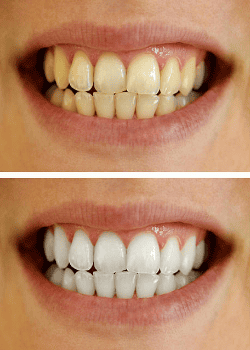
Also, besides that here are the other potential side effects of it mentioned in this article:
- diarrhea
- allergic reactions
- blood thinning
Again – you can lower the risk of diarrhea by starting with a low amount of Turmeric.
After your body is adjusted, you can gradually increase your intake.
In terms of an allergic reaction, you need to make sure that it's not an allergen for you.
Well, this is to avoid experiencing symptoms related to allergies as early as possible.
Lastly – consuming only Turmeric won't make your blood excessively thin.
But be cautious with incorporating it with your anticoagulant medications.
Overall – Turmeric is generally safe and in fact, it has some amazing benefits for health.
But to reduce the risks of possible side effects, you need to be mindful before trying it.
References:
1 – https://pubmed.ncbi.nlm.nih.gov/-26195911/
2 – https://www.frontiersin.org/articles/10.3389/-fnut.2022.1040259/
3 – https://pubmed.ncbi.nlm.nih.gov/-6958711/
4 – https://www.ucsfhealth.org/conditions/diarrhea/-symptoms/
5 – https://www.sciencedirect.com/science/article/-S175646462200384X/
6 – https://www.ncbi.nlm.nih.gov/books/-NBK92752/
7 – https://www.health.harvard.edu/newsletter_article/-sensitive-gut/
8 – https://www.sciencedirect.com/topics/-intestine-motility/
9 – https://www.ncbi.nlm.nih.gov/pmc/articles/-PMC3816948/
10 – https://www.ncbi.nlm.nih.gov/books/-NBK545237/
11 – https://www.nhs.uk/conditions/-allergies/
12 – https://www.hopkinsmedicine.org/health/allergies-and-the-immune-system/
13 – https://www.sciencedirect.com/agricultural-and-biological-sciences/-zingiberaceae/
14 – https://www.ncbi.nlm.nih.gov/books/-NBK2396/
15 – https://www.cancer.gov/publications/cancer-terms/-blood-thinner
16 – https://www.nhs.uk/conditions/anticoagulants/-uses/
17 – https://pubmed.ncbi.nlm.nih.gov/-10484074/
18 – https://www.nhs.uk/conditions/anticoagulants/-side-effects/

